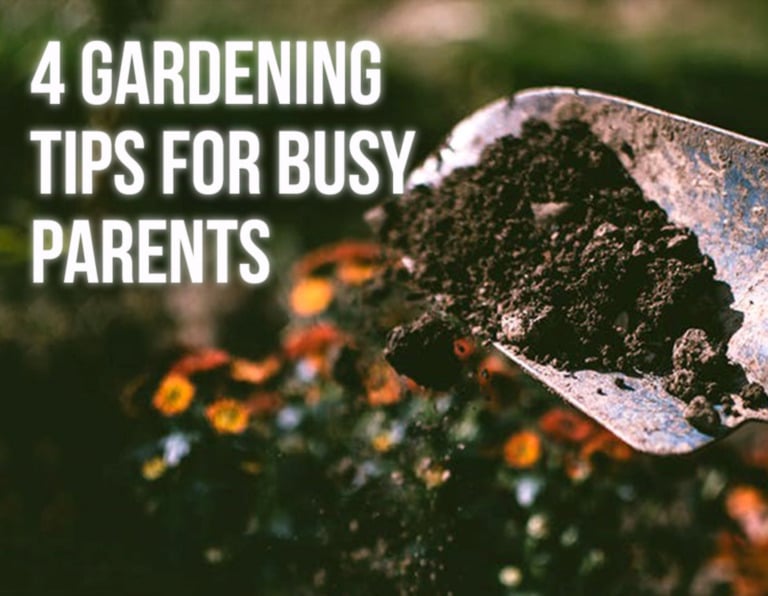
I'm sure we all like being smart with our time, and often it's a battle of prioritising work, kids activities any housework and more. Gardening is one such task which often suffers, especially as having green fingers can take up a MASSIVE amount of time.
We've been lucky enough to hear from Nicky who is the Online Horticultural Expert at Wyevale Garden Centres.
He has been kind enough to share some top time-saving tips which can keep you on top of those weeds, and here they are;

As a parent, you’ll be all too familiar with the number of sacrifices you make for your kids. But, when it comes to your garden, even the busiest of us can find time to tend to their gorgeous greenery and bright blooms.
Here, I will be sharing my top tips for keeping your garden in tip-top condition no matter how much you’ve got on your plate.
1. Feed your soil with mulch
If the pressures of having kids often mean you forget to water the plants, mulch could be your new best friend. Made from completely organic materials including shreddings of bark, cocoa mulls and manure, mulch is a completely nutritious food source for your soil that’ll help it retain moisture in even the driest conditions. Plus, as it slowly releases this goodness as it decomposes, it won’t matter as much if you miss a week (or two!) of gardening.
I recommend adding a layer of mulch into your garden in any areas where you have plants and flowers that need regular watering. It can even be spread in places that are prone to growing weeds as this compost will restrict the growth, so your garden can look great for longer and minimising the amount of time you need to spend weeding.
2. Install a drip irrigation system

Drip irrigation systems are becoming more and more popular in gardens due to their convenience. These smart systems are efficient in watering your flowers and plants on their own and will also only deliver the necessary amount of water. Best of all, they can be linked up to timers, so you can leave your plants for weeks at a time to be fed automatically by the irrigator: perfect for all of you with hectic lifestyles!
But, be aware that these can take a few hours to install and may require some pipework to hide any wires and equipment. And, if you have a large garden this could mean splitting the pipes up into different zones, as your outdoor tap may not have the supply to feed all your garden plants at once.
Once you’ve planned the pipe route, you’ll then need to consider what drippers to use and how many you need — adjustable drippers can be used to cover multiple plants at once while fixed flow ones are good for watering each plant individually. These are simple enough to install yourself, but if you’re not quite a dab-hand with technology, a garden landscaper is sure to be able to help you.
3. Pick low maintenance plants
When you’ve not got a lot of spare time on your hands, having beautiful bloomers — like lilies and roses — which require a lot of attention probably isn’t the best idea. However, there are plenty of other plants you can introduce into your garden that look just as good, but which don’t require as much care.
Lavender is a great example of a low maintenance shrub that requires minimum input from you. Simply prune it after it flowers and provides it with a good drainage position, and this will be enough to keep it in great condition even if the soil isn’t in good shape. There are even low maintenance bedding plants like fuchsias, which only need pruning when they’re young, and feeding with fertiliser once a month. So, you don’t have to worry about heading outside after a busy day running around after the kids.
4. Use wildlife to benefit your garden

If you don’t have the time to regularly check up on your garden’s progress, you’ll be pleased to know that wildlife can bring benefits to your garden. For example, earthworms can aerate the soil and help mix dead vegetation and other animal waste to create a nutrient-rich compost that’ll keep your plants healthy for longer.
If you’ve got a pond in your garden, placing some tadpoles which will grow into frogs could be a big help. Frogs and toads eat slugs, snails and other insects which could be harming your plants and flowers so your garden can thrive without your undivided attention.
It can be difficult to find the time to tend to your garden when you’re a busy parent, but with my top tips, some smart thinking and the occasional spare hour, you’ll have a garden to be envious of all-year-round.
For more articles like this, visit the Attach A Tag Blog


 US - English ($)
US - English ($)